人教版六年级上册英语单词和句子
人教版小学英语六年级上册四会单词及句子
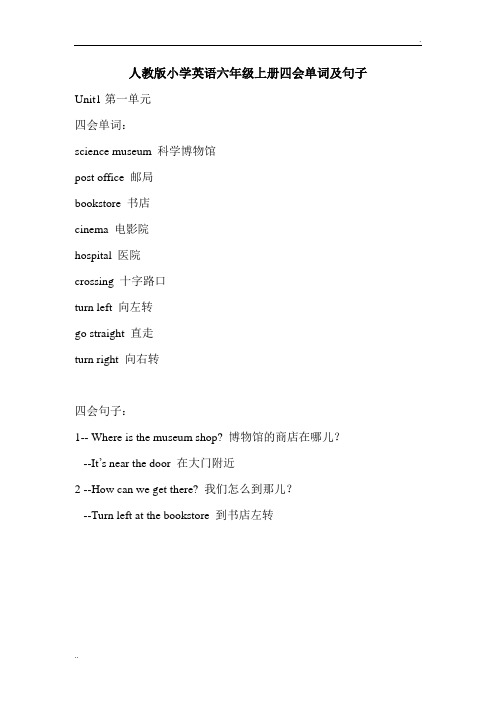
人教版小学英语六年级上册四会单词及句子Unit1 第一单元四会单词:science museum 科学博物馆post office 邮局bookstore 书店cinema 电影院hospital 医院crossing 十字路口turn left 向左转go straight 直走turn right 向右转四会句子:1-- Where is the museum shop? 博物馆的商店在哪儿?--It’s near the door 在大门附近2 --How can we get there? 我们怎么到那儿?--Turn left at the bookstore 到书店左转四会单词:on foot 走路by bus 乘公共汽车by taxi 乘出租车by plane 乘飞机by subway 乘地铁by ship 乘船by train 乘火车slow down 减速stop 停下wait 等go 走四会句子:1-- How do you come to school? 你怎么来学校的?--Usually, I come on foot 通常我走路来2 In the USA people on bikes must wear one 在美国骑自行车的人必须戴头盔3 Don’t go at the red light! 别闯红灯4 I must pay attention to the traffic lights 我必须注意交通信号灯四会单词:visit my grandparents 拜访我的外祖父母see a film 看电影take a trip 远行go to the supermarket 去超市dictionary 词典comic book 连环画书word book 单词书postcard 明信片四会句子:1 --What are you going to do tomorrow? 你明天打算做什么?--I’m going to have an art lesson. 我要上美术课2 We’re going to draw some pictures in Renmin Park. 我要到人民公园去画画3 --Where are you going? 你们打算去哪儿?--We’re going to the cinema 我们打算去电影院4 When are you going? 你们什么时候去?四会单词:dance 跳舞sing 唱歌read stories 看故事书play football 踢足球do kung fu 打功夫cook Chinese food 做中国菜study Chinese 学习汉语do word puzzles 猜字谜go hiking 远足四会句子:1 --What are Peter ’s hobbies? 彼得有什么爱好?--He likes reading stories 他喜欢读故事2 --Does he live in Sydney? 他住在悉尼吗?--No, he doesn’t 不,他没有3 --Does he like doing word puzzles and going hiking? 他喜欢猜字谜和远足吗?--Yes, he does是的,他喜欢四会单词:factory worker 工厂工人postman 邮递员businessman 生意人police officer 警察fisherman 渔民scientist 科学家pilot 飞行员coach 教练四会句子:1 --What does he do? 他是做什么的?--He is a businessman. 他是商人2--Where does he work? 他在哪儿工作?-- He works at sea. 他在海上工作。
人教版英语六年级上册单词总结

人教版英语六年级上册单词总结Unit 1by (经,乘) foot(脚) bike(自行车) bus(公共汽车) train(火车) how(怎样) go to school(上学) traffic(交通) traffic light(交通灯) traffic rule(交通规则) stop(停,停车站) wait(等待) get to(到达)Unit 2library(图书馆) post office(邮局) hospital(医院) cinema(电影院) bookstore(书店) where(在哪里,到哪里) please(请) next to(与…相邻) turn(转弯) right (右边) left(左边) straight(成直线地) then (然后)Unit 3next week(下周) this morning(今天上午) this afternoon(今天下午) this evening(今天晚上) comic book(漫画书) post card(明信片) newspaper(报纸) buy(购买)Unit 4hobby(爱好) ride a bike--riding a bike(骑自行车) dive--diving(跳水) play the violin—playing the violin(拉小提琴) make kites—making kites(制作风筝) collect stamps—collecting stamps(集邮) live –lives(居住) teaches—teaching(教) go—goes(去) watch--watches(看) read--reads(读,看) doesd oesn’t=does notUnit 5singer(歌唱家,歌手) writer(作家) actor(男演员) actress(女演员) artist(画家) TV reporter(电视台记者) engineer(工程师) accountant(会计) policeman(男警察) salesperson(销售员) cleaner(清洁工) where(在哪里,到哪里) work(工作)Unit 6rain(雨) cloud (云) sun(太阳) stream(河,溪) come from(来自,从…来) seed(种子) soil(土壤) sprout (苗,芽) plant(植物,种植) should (应该) then(然后)单词详解Unit 1by经,乘解析:by+交通工具,表示乘坐某种交通工具,中间无冠词。
人教版六年级上册英语单词和句子完整版

人教版六年级上册英语单词和句子HEN system office room 【HEN16H-HENS2AHENS8Q8-HENH1688】人教版六年级上册英语单词和句子Unit 1 How can I get there? 我怎样去那儿?science 科学museum 博物馆post?office 邮局bookstore 书店cinema 电影院hospital 医院crossing 十字路口turn?left 左转go?straight 笔直走turn?right 右转sir 先生Italian 意大利的restaurant 餐馆get 到达map 地图compass 指南针GPS 定位系统follow 跟着far 远next?to?与...... 相邻near 在 ...... 附近Where?is?the?cinema? 电影院在哪?It ‘s?next?to?the?bookstore. 它紧邻书店。
How?can?I?get?there? 我怎样到那儿?Turn?left?at?the?bookstore. 在书店左转。
Turn?right?at?the?hospital.在医院右转。
Is it far? 那儿远吗?No,it ’ s?near. 不,它很近。
Unit 2Ways to go to school. 去上学的方式。
on?foot 步行by 经,乘bus 公共汽车plane 飞机taxi 出租车ship 大船subway 地铁slow?down 减速train 火车stop 停,停车站foot 脚traffic 交通traffic?lights 交通信号灯bike 自行车fast 快的ferry 轮渡sled 雪橇must 必须on?foot 步行by?bus 乘公共汽车by?bike 骑自行车by?plane 乘飞机by?taxi 坐出租车by?ship 乘轮船by?subway 坐地铁by?sled 坐雪橇by?ferry 轮渡Stop?and?wait?at?a?red?light. 红灯停下等待。
人教版2023的六年级上册英语单词及重点句子
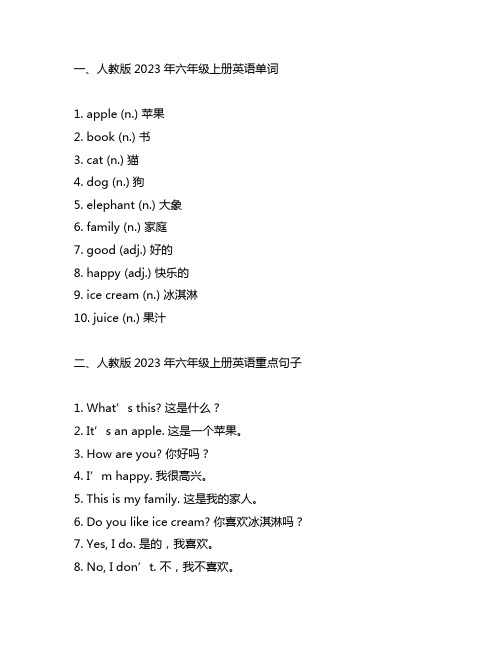
一、人教版2023年六年级上册英语单词1. apple (n.) 苹果2. book (n.) 书3. cat (n.) 猫4. dog (n.) 狗5. elephant (n.) 大象6. family (n.) 家庭7. good (adj.) 好的8. happy (adj.) 快乐的9. ice cream (n.) 冰淇淋10. juice (n.) 果汁二、人教版2023年六年级上册英语重点句子1. What’s this? 这是什么?2. It’s an apple. 这是一个苹果。
3. How are you? 你好吗?4. I’m happy. 我很高兴。
5. This is my family. 这是我的家人。
6. Do you like ice cream? 你喜欢冰淇淋吗?7. Yes, I do. 是的,我喜欢。
8. No, I don’t. 不,我不喜欢。
9. I like reading books. 我喜欢读书。
10. Cats are cute. 猫很可爱。
三、总结上述单词和句子是人教版2023年六年级上册英语教材中的重点内容,掌握这些基本的词汇和句子结构对于学习英语的初学者来说至关重要。
通过课堂学习和日常练习,孩子们可以逐渐掌握这些单词和句子,进而提高他们的英语表达能力。
希望家长和老师们能够给予孩子们充分的支持和鼓励,让他们在学习英语的道路上不断进步,取得优异的成绩。
根据以上的内容,在学完这些基础词汇和句子后,学生将逐渐迈入更深入的英语学习。
在六年级上册的英语课程中,学生将开始接触更多的文化知识和语法规则,以及扩展词汇的学习。
以下是一些扩展内容:一、名词复数形式在六年级上册的英语课程中,学生将会学习名词的复数形式。
名词的复数形式通常是在词尾加上-s或-es。
单数形式的cat变为复数形式cats,单数形式的apple变为复数形式apples。
名词的复数形式在句子中的应用也是十分重要的。
人教版英语书六年级上册单词

人教版英语书六年级上册单词Unit 1 How can I get there?1. science [ˈsaɪəns] (n.) 科学。
2. museum [mjuˈziːəm] (n.) 博物馆。
3. post office [pəʊst ˈɒfɪs] (n.) 邮局。
4. bookstore [ˈbʊkstɔː(r)] (n.) 书店。
5. cinema [ˈsɪnəmə] (n.) 电影院。
6. hospital [ˈhɒspɪtl] (n.) 医院。
7. crossing [ˈkrɒsɪŋ] (n.) 十字路口。
8. turn [tɜːn] (v.) 转弯。
9. left [left] (adv. & n.) 左;左边。
10. straight [streɪt] (adv. & adj.) 笔直地;直的。
11. right [raɪt] (adv. & n.) 右;右边。
12. ask [ɑːsk] (v.) 问。
13. sir [sɜː(r)] (n.) (对男子的礼貌称呼)先生。
14. interesting [ˈɪntrəstɪŋ] (adj.) 有趣。
15. Italian [ɪˈtæliən] (adj. & n.) 意大利的;意大利人(语)的。
16. restaurant [ˈrestrɒnt] (n.) 餐馆。
17. pizza [ˈpiːtsə] (n.) 比萨饼。
18. street [striːt] (n.) 大街;街道。
19. get [ɡet] (v.) 到达。
20. GPS [ˌdʒiː piːˈes] (n.) 全球(卫星)定位系统。
Unit 2 Ways to go to school.1. on foot [ɒn fʊt] 步行。
2. by [baɪ] (prep.) (表示方式)乘。
3. bus [bʌs] (n.) 公共汽车。
人教版六年级英语上册全部单词+重点句型汇总
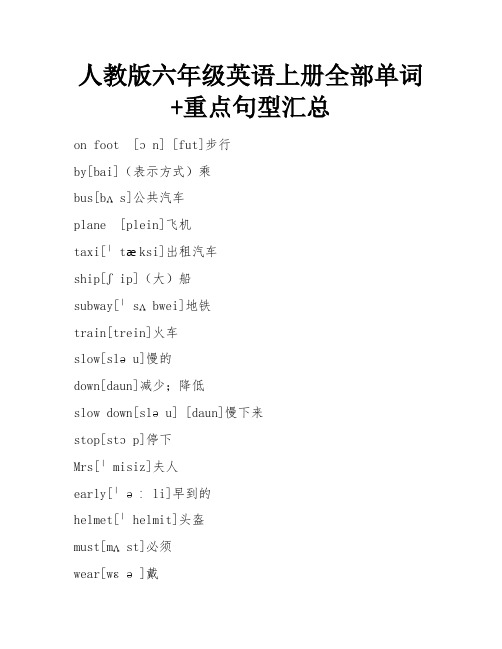
人教版六年级英语上册全部单词+重点句型汇总on foot [ɔn] [fut]步行by[bai](表示方式)乘bus[bʌs]公共汽车plane [plein]飞机taxi[ˈtæksi]出租汽车ship[ʃip](大)船subway[ˈsʌbwei]地铁train[trein]火车slow[sləu]慢的down[daun]减少;降低slow down[sləu] [daun]慢下来stop[stɔp]停下Mrs[ˈmisiz]夫人early[ˈəːli]早到的helmet[ˈhelmit]头盔must[mʌst]必须wear[wɛə]戴attention[əˈtenʃən]注意pay attention to[pei]注意pay[pei] v.付款;给予(注意) n.工资traffic[ˈtræfik]交通traffic lights交通信号灯Munich[ˈmju:nik]慕尼黑(德国城市)Germany[ˈdʒə:məni]德国Alaska[əˈlæskə]阿拉斯加州(美国州名)sled[sled]雪橇fast[fɑ:st]快的ferry[ˈferi]轮渡Papa Westray[,pɑːpəˈwestrei]帕帕韦斯特雷岛Scotland [ˈskɔtlənd]苏格兰1.---How do you e to school? 你怎么上学?----Usually, I e on foot. 通常我走路来的。
2.---How can I get to the Fuxing Hospital? 我怎么能到达复兴医院?----Take the No.57 bus over there. 你可以在那边乘57路公交车。
3. In the USA people on bikes must wear one.在美国骑车的人必须戴头盔。
4. Don’t go at the red light. 别闯红灯。
人教版小学英语六年级上册四会单词及句子

人教版小学英语六年级上册四会单词及句子Unit1 第一单元四会单词:science museum 科学博物馆post office 邮局bookstore 书店cinema 电影院hospital 医院crossing 十字路口turn left 向左转go straight 直走turn right 向右转四会句子:1—- Where is the museum shop? 博物馆的商店在哪儿? -—It's near the door 在大门附近2 --How can we get there? 我们怎么到那儿?-—Turn left at the bookstore 到书店左转四会单词:on foot 走路by bus 乘公共汽车by taxi 乘出租车by plane 乘飞机by subway 乘地铁by ship 乘船by train 乘火车slow down 减速stop 停下wait 等go 走四会句子:1—— How do you come to school?你怎么来学校的?-—Usually, I come on foot 通常我走路来2 In the USA people on bikes must wear one 在美国骑自行车的人必须戴头盔3 Don’t go at the red light!别闯红灯4 I must pay attention to the traffic lights 我必须注意交通信号灯四会单词:visit my grandparents 拜访我的外祖父母see a film 看电影take a trip 远行go to the supermarket 去超市dictionary 词典comic book 连环画书word book 单词书postcard 明信片四会句子:1 --What are you going to do tomorrow? 你明天打算做什么?-—I’m going to have an art lesson. 我要上美术课2 We’re going to draw some pictures in Renmin Park. 我要到人民公园去画画3 ——Where are you going? 你们打算去哪儿?--We’re going to the cinema 我们打算去电影院4 When are you going? 你们什么时候去?四会单词:dance 跳舞sing 唱歌read stories 看故事书play football 踢足球do kung fu 打功夫cook Chinese food 做中国菜study Chinese 学习汉语do word puzzles 猜字谜go hiking 远足四会句子:1 -—What are Peter ’s hobbies?彼得有什么爱好?-—He likes reading stories 他喜欢读故事2 ——Does he live in Sydney? 他住在悉尼吗?——No, he doesn’t 不,他没有3 —-Does he like doing word puzzles and going hiking? 他喜欢猜字谜和远足吗?—-Yes, he does是的,他喜欢四会单词:factory worker 工厂工人postman 邮递员businessman 生意人police officer 警察fisherman 渔民scientist 科学家pilot 飞行员coach 教练四会句子:1 —-What does he do?他是做什么的? ——He is a businessman. 他是商人2-—Where does he work?他在哪儿工作? -— He works at sea。
六年级上册英语单词和句子

六年级上册英语单词和句子Unit 1 How can I get there?一、单词。
1. science [ˈsaɪəns] (n. 科学)2. museum [mjuˈziːəm] (n. 博物馆)3. post office [pəʊst ˈɒfɪs] (n. 邮局)4. bookstore [ˈbʊkstɔː(r)] (n. 书店)5. cinema [ˈsɪnəmə] (n. 电影院)6. hospital [ˈhɒspɪtl] (n. 医院)7. crossing [ˈkrɒsɪŋ] (n. 十字路口)8. turn [tɜːn] (v. 转弯)9. left [left] (adv. 向左;n. 左边)10. straight [streɪt] (adv. 笔直地;adj. 直的)11. right [raɪt] (adv. 向右;n. 右边;adj. 正确的)二、句子。
1. - Where is the museum shop? [weə(r) ɪz ðə mjuˈziːəm ʃɒp] 博物馆的商店在哪儿?- It's near the door. [ɪts nɪə(r) ðə dɔː(r)] 在大门附近。
2. - How can I get to the bookstore? [haʊ kæn aɪɡet tuːðəˈbʊkstɔː(r)] 我怎么到书店呢?- Turn left at the second crossing. [tɜːn left æt ðəˈsekənd ˈkrɒsɪŋ] 在第二个十字路口左转。
Unit 2 Ways to go to school.一、单词。
1. on foot [ɒn fʊt] (步行)2. by [baɪ] (prep. 乘)3. bus [bʌs] (n. 公共汽车)4. plane [pleɪn] (n. 飞机)5. taxi [ˈtæksi] (n. 出租车)6. ship [ʃɪp] (n. 船)7. subway [ˈsʌbweɪ] (n. 地铁)8. train [treɪn] (n. 火车)9. slow [sləʊ] (adj. 慢的)10. down [daʊn] (adv. 减少;降低;prep. 沿着)11. slow down [sləʊ daʊn] (慢下来)12. stop [stɒp] (n. 车站;v. 停止)二、句子。
小学人教PEP英语六年级上册重点单词、短语、句型汇总
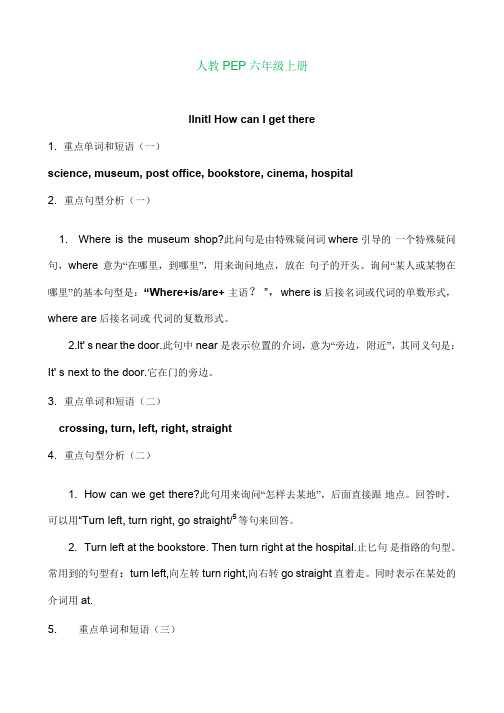
人教PEP六年级上册llnitl How can I get there1. 重点单词和短语(一)science, museum, post office, bookstore, cinema, hospital2. 重点句型分析(一)1. Where is the museum shop?此问句是由特殊疑问词where引导的一个特殊疑问句,where意为“在哪里,到哪里”,用来询问地点,放在句子的开头。
询问“某人或某物在哪里”的基本句型是:“Where+is/are+ 主语?”,where is后接名词或代词的单数形式,where are后接名词或代词的复数形式。
2.lt' s near the door.此句中near是表示位置的介词,意为“旁边,附近”,其同义句是:It' s next to the door.它在门的旁边。
3. 重点单词和短语(二)crossing, turn, left, right, straight4. 重点句型分析(二)1. How can we get there?此句用来询问“怎样去某地”,后面直接跟地点。
回答时,可以用“Turn left, turn right, go straight/5等句来回答。
2. Turn left at the bookstore. Then turn right at the hospital.止匕句是指路的句型。
常用到的句型有:turn left,向左转turn right,向右转go straight直着走。
同时表示在某处的介词用at.5. 重点单词和短语(三)Tasty, buy, London Eye, next to, far from, go straight, turn left, stomach 6. 重点句型分析(三)Is the Thames far from here? No.此句是个be动词开头的一般疑问句,其回答要用yes或no.句中的far from意为“离 ............................................. 远”。
最新(pep)人教版六年级英语上册单词表及重点句子
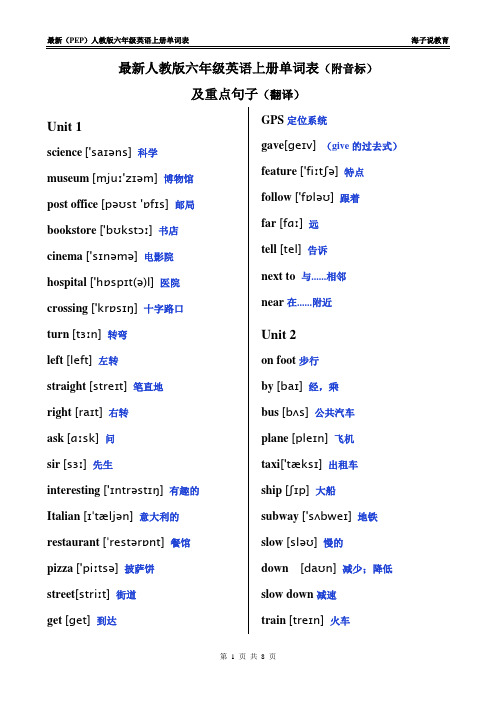
最新人教版六年级英语上册单词表(附音标)及重点句子(翻译)Unit 1science['saɪəns] 科学museum [mjuː'zɪəm] 博物馆post office [pəʊst 'ɒfɪs] 邮局bookstore ['bʊkstɔː]书店cinema ['sɪnəmə] 电影院hospital ['hɒspɪt(ə)l] 医院crossing ['krɒsɪŋ]十字路口turn [tɜːn]转弯left [left]左转straight [streɪt]笔直地right [raɪt] 右转ask [ɑːsk]问sir [sɜː]先生interesting ['ɪntrəstɪŋ]有趣的Italian [ɪˈtæljən] 意大利的restaurant [ˈr estərɒnt] 餐馆pizza ['piːtsə] 披萨饼street[striːt]街道get [get] 到达GPS定位系统gave[ɡeɪv](give的过去式)feature ['fiːtʃə] 特点follow ['fɒləʊ] 跟着far [fɑː]远tell [tel] 告诉next to 与......相邻near在......附近Unit 2on foot步行by [baɪ] 经,乘bus [bʌs]公共汽车plane [pleɪn] 飞机taxi['tæksɪ] 出租车ship [ʃɪp] 大船subway ['sʌbweɪ] 地铁slow [sləʊ] 慢的down [daʊn] 减少;降低slow down减速train [treɪn] 火车重点句子(翻译)Unit1Where is the cinema?翻译:It’s next to the bookstore.翻译:How can I get there?翻译:Turn left at the bookstore.翻译:Turn right at the hospital.翻译:Unit2Stop and wait at a red light翻译:Slow down and stop at a yellow light.翻译:Go at a green light.翻译:How do you go to school?翻译:Usually, I go on foot.翻译:In the USA people on bikes must wear one. 翻译:Don't go at the red light!翻译:I must pay attention to the traffic lights! 翻译:Unit3visit my grandparents翻译:What are you going to do tomorrow?翻译:I'm going to have an English lesson.翻译:We're going to cook in Renmin Park.翻译:Where are you going?翻译:We're going to the cinema.翻译:When are you going?翻译:Unit4What are your hobbies?翻译:What are Peter's hobbies?翻译:He likes reading stories.翻译:Does he live in China?翻译:No, he doesn't.翻译:Does he like doing word puzzles and going hiking? 翻译:Yes, he does.翻译:Unit5What does he do?翻译:He is a student.翻译:He's a businessman.翻译:Where does he work?翻译:He works at sea.翻译:How does he go to work?翻译:He goes to work by bike翻译:Unit6take a deep breath 翻译:What's wrong?翻译:I am happy.翻译:He is sad.翻译:She is angry.翻译:We are worried. 翻译:Your father is ill. 翻译:Don't be sad.翻译:Don't worry.翻译:。
小学人教PEP英语六年级上册重点单词、短语、句型汇总

人教PEP六年级上册llnitl How can I get there1. 重点单词和短语(一)science, museum, post office, bookstore, cinema, hospital2. 重点句型分析(一)1. Where is the museum shop?此问句是由特殊疑问词where引导的一个特殊疑问句,where意为“在哪里,到哪里”,用来询问地点,放在句子的开头。
询问“某人或某物在哪里”的基本句型是:“Where+is/are+ 主语?”,where is后接名词或代词的单数形式,where are后接名词或代词的复数形式。
2.lt' s near the door.此句中near是表示位置的介词,意为“旁边,附近”,其同义句是:It' s next to the door.它在门的旁边。
3. 重点单词和短语(二)crossing, turn, left, right, straight4. 重点句型分析(二)1. How can we get there?此句用来询问“怎样去某地”,后面直接跟地点。
回答时,可以用“Turn left, turn right, go straight/5等句来回答。
2. Turn left at the bookstore. Then turn right at the hospital.止匕句是指路的句型。
常用到的句型有:turn left,向左转turn right,向右转go straight直着走。
同时表示在某处的介词用at.5. 重点单词和短语(三)Tasty, buy, London Eye, next to, far from, go straight, turn left, stomach 6. 重点句型分析(三)Is the Thames far from here? No.此句是个be动词开头的一般疑问句,其回答要用yes或no.句中的far from意为“离 ............................................. 远”。
人教版英语六年级上册单词

人教版英语六年级上册单词Unit 1science [ˈsaɪəns] n. 科学museum [mjuˈziːəm] n. 博物馆post office [pəʊst ˈɒfɪs] 短语邮局bookstore [ˈbʊkstɔː(r)] n. 书店cinema [ˈsɪnəmə] n. 电影院hospital [ˈhɒspɪtl] n. 医院crossing [ˈkrɒsɪŋ] n. 十字路口turn [tɜːn] v. 转弯left [left] n. 左边straight [streɪt] adv. 笔直地right [raɪt] n. 右边ask [ɑːsk] v. 问sir [sɜː(r)] n. (对男子的礼貌称呼)先生interesting [ˈɪntrəstɪŋ] adj. 有趣的pizza [ˈpiːtsə] n. 比萨饼street [striːt] n. 大街;街道get [ɡet] v. 到达GPS [ˌdʒiː piːˈes] 缩写全球(卫星)定位系统gave [ɡeɪv] (give 的过去式) v. 提供;交给feature [ˈfiːtʃə(r)] n. 特点follow [ˈfɒləʊ] v. 跟着far [fɑː(r)] adj. 远的tell [tel] v. 告诉Unit 2on foot [ɒn fʊt] 短语步行by [baɪ] prep. (表示方式)乘bus [bʌs] n. 公共汽车plane [pleɪn] n. 飞机taxi [ˈtæksi] n. 出租汽车ship [ʃɪp] n. (大)船subway [ˈsʌbweɪ] n. 地铁train [treɪn] n. 火车slow [sləʊ] adj. 慢的down [daʊn] adv. 减少;降低slow down [sləʊ daʊn] 短语慢下来stop [stɒp] v. 停下Mrs [ˈmɪsɪz] 缩写夫人early [ˈɜːli] adj. 早到的helmet [ˈhelmɪt] n. 头盔must [mʌst] modal v. 必须wear [weə(r)] v. 戴attention [əˈtenʃn] n. 注意pay attention to [peɪəˈtenʃn tuː] 短语注意traffic [ˈtræfɪk] n. 交通traffic lights [ˈtræfɪk laɪts] 短语交通信号灯Munich [ˈmjuːnɪk] 地名慕尼黑(德国城市)Germany [ˈdʒɜːməni] 地名德国Alaska [əˈlæskə] 地名阿拉斯加州(美国州名)sled [sled] n. 雪橇fast [fɑːst] adj. 快的ferry [ˈferi] n. 轮渡Papa Westray [ˌpɑːpəˈwestreɪ] 地名帕帕韦斯特雷岛Scotland [ˈskɒtlənd] 地名苏格兰Unit 3visit [ˈvɪzɪt] v. 拜访film [fɪlm] n. 电影see a film [siːə fɪlm] 短语看电影trip [trɪp] n. 旅行take a trip [teɪk ə trɪp] 短语去旅行supermarket [ˈsuːpəmɑːkɪt] n. 超市evening [ˈiːvnɪŋ] n. 晚上;傍晚tonight [təˈnaɪt] adv. 在今晚tomorrow [təˈmɒrəʊ] adv. 明天next week [nekst wiːk] 短语下周dictionary [ˈdɪkʃənri] n. 词典comic [ˈkɒmɪk] adj. 滑稽的comic book [ˈkɒmɪk bʊk] 短语连环画册word [wɜːd] n. 单词word book [wɜː d bʊk] 短语单词书postcard [ˈpəʊstkɑːd] n. 明信片lesson [ˈlesn] n. 课space [speɪs] n. 太空travel [ˈtrævl] v. (尤指长途)旅行half [hɑːf] n. 一半price [praɪs] n. 价格Mid-Autumn Festival [mɪ d ˈɔːtəm ˈfestɪvl] 短语中秋节together [təˈɡeðə(r)] adv. 一起get together [ɡet təˈɡeðə(r)] 短语聚会mooncake [ˈmuːnkeɪk] n. 月饼poem [ˈpəʊɪm] n. 诗moon [muːn] n. 月亮Unit 4studies [ˈstʌdiz] (study 的第三人称单数形式) v. 学习puzzle [ˈpʌzl] n. 谜hiking [ˈhaɪkɪŋ] n. 远足pen pal [pen pæl] 短语笔友hobby [ˈhɒbi] n. 业余爱好jasmine [ˈdʒæzmɪn] n. 茉莉idea [aɪˈdɪə] n. 想法;主意Canberra [ˈkænbərə] 地名堪培拉(澳大利亚首都)amazing [əˈmeɪzɪŋ] adj. 令人惊奇的shall [ʃæl] modal v. 表示征求意见goal [ɡəʊl] n. 射门join [dʒɔɪn] v. 加入club [klʌb] n. 俱乐部share [ʃeə(r)] v. 分享Unit 5factory [ˈfæktri] n. 工厂worker [ˈwɜːkə(r)] n. 工人postman [ˈpəʊstmən] n. 邮递员businessman [ˈbɪznəsmæn] n. 商人;企业家police officer [pəˈliːs ˈɒfɪsə(r)] 短语警察fisherman [ˈfɪʃəmən] n. 渔民scientist [ˈsaɪəntɪst] n. 科学家pilot [ˈpaɪlət] n. 飞行员coach [kəʊtʃ] n. 教练country [ˈkʌntri] n. 国家head teacher [hed ˈtiːtʃə(r)] 短语校长sea [siː] n. 大海stay [steɪ] v. 保持university [ˌjuːnɪˈvɜːsəti] n. 大学gym [dʒɪm] n. 体育馆if [ɪf] conj. 如果reporter [rɪˈpɔːtə(r)] n. 记者use [juːz] v. 使用type [taɪp] v. 打字quickly [ˈkwɪkli] adv. 迅速地secretary [ˈsekrətri] n. 秘书Unit 6angry [ˈæŋɡri] adj. 生气的afraid [əˈfreɪd] adj. 害怕sad [sæd] adj. 难过的worried [ˈwʌrid] adj. 担心的;发愁的happy [ˈhæpi] adj. 高兴的see a doctor [siːəˈdɒktə(r)] 短语看病wear [weə(r)] v. 穿more [mɔː(r)] adj. 更多的deep [diːp] adj. 深的breath [breθ] n. 呼吸take a deep breath [teɪk ə diːp breθ] 短语深深吸一口气count [kaʊnt] v. 数数count to ten [kaʊnt tuː ten] 短语数到十chase [tʃeɪs] v. 追赶mouse [maʊs] n. (mouse 的复数)老鼠bad [bæd] adj. 邪恶的;坏的hurt [hɜːt] v. (使)受伤ill [ɪl] adj. 有病;不舒服wrong [rɒŋ] adj. 有毛病feel [fiːl] v. 觉得;感到well [wel] adj. 健康;身体好sit [sɪt] v. 坐grass [ɡrɑːs] n. 草坪hear [hɪə(r)] v. 听见ant [ænt] n. 蚂蚁worry [ˈwʌri] v. 担心;担忧stuck [stʌk] adj. 陷住;无法移动mud [mʌd] n. 泥pull [pʊl] v. 拉;拽everyone [ˈevriwʌn] pron. 每人。
人教版小学英语六年级全册单词表(带有音标)

人教版小学英语·六年级上册·单词表Unit 1by:经,乘foot:脚bike:自行车bus:公共汽车train:火车plane:飞机ship:船;舰subway:地铁how:怎样fifth:第五traffic:交通traffic light:交通灯traffic rule:交通规则stop:停,停车站wait:等待remember:记住get to:到达find:寻找;找到difference:不同;区别same:相同的every:每个;所有的country:国家always:总是mean:意思是drive:驾驶right:右边的side:边England:英国Australia:澳大利亚however:但是left:左边的know:知道Unit 2library:图书馆post:邮局hospital:医院cinema:书店science:科学博物馆excuse:me 对不起where:在哪里,到哪里please:请next to:与…相邻far:远supermarket:超市bank:银行want:想要buy:买get off:下车minute:分钟north:北south:南east:东west:西turn:转弯right:右边left:左边straigh:成直线地then:然后twelfth:第二十party:聚会;晚会tell 告诉start:开始take:乘坐look for:寻找Unit 3next week:下周morning:上午afternoon:下午evening:晚上tonight:今晚tomorrow:明天trip:旅行magazine:杂志cinema:去看电影theme:主题公园Great:长城busy:忙碌的together:一起地comic:漫画书post:报纸magazine:杂志dictionary:词典;字典buy:购买need:需要plant:植物else:其他;另外shop:商店Unit 4hobby:爱好collect:集邮show:展览pen pal 笔友dear:亲爱的twin:双胞胎之一something:某事物must:一定;肯定fun:快乐;乐趣with:同…reporter:记者live:居住teach:教different:不同的week:星期;周say:说soon:不久excited:兴奋的;激动的Unit 5singer:作家actor:男演员actress:女演员artis:画家Hong Kong:香港engineer:清洁工company:公司where:在哪里,到哪里work:工作factory:工厂design:设计tip:有用的小建议help:帮助money:钱well:好;对;满意地enjoy:从…获得乐趣touris:旅行者;way:路;道police:警方;警察部门Unit 6rain:雨cloud:云vapour:蒸汽;水汽sun:太阳stream:河,溪shine:照耀become:变成little:小的drop:一滴wake:up 醒来feel:感觉到think:想;思考meet:遇见high:高的other:其他的fall:落下down:向下into:进入come out:露出again:又seed:种子soil:土壤sprout:苗,芽plant:植物,种植should:应该then:然后garden:花园easy:简单的put:放several:一些day:天see:看见pot:锅碗瓢盆lovely:可爱的make sure:核实month:月份still:仍然hardly:几乎不人教版小学英语·六年级下册·单词表Unit 1tall:高的short:矮的strong:强壮的old:老的young:年轻的than:与…相比较funnier:更滑稽的heavy:重的long:长的thin:更瘦的small:小feet:脚:复数size:号码;尺码wear:穿meter:米ton:吨each:各自;每个squid:鱿鱼lobster:龙虾shark:鲨鱼deep:深的seal:海豹sperm:抹香鲸killer:whale 虎鲸even:甚至Unit 2sore:疼的feel:感觉sick:不舒服的;有病的hurt:疼痛nose:鼻子people:人们flu:流感know:知道might:可以;能worry:烦恼;担忧medicine:药drink:饮料stay:在;逗留better:更好的soon:立刻;不久tired:疲劳的,累的excited:兴奋的angry:生气的happy:高兴的bored:无聊的,烦人的sad:忧伤的,悲伤的trip:旅行fail:不及格;失败test:测试hear:听见match:比赛between:在…之间pass:传递kick:踢goal:得分bounce:反弹off:距;离;离开another:另一个guess:猜测win:赢game:比赛laugh:笑Unit 3watch:看wash:洗clean:打扫visit:看望weekend:周末went:去,go的过去式park:去公园swimming:游泳fish:钓鱼read:读hiking:郊游yesterday:昨天study:学习tongue:绕口令fiy:飞return:送回;归还swim:游泳Unit 4learn:学习sing:唱歌danced:跳舞food:食物climb:爬presents:礼物boat:划船elephant:大象skiing:滑雪how怎么,如何get:到达last:上一个的,仅余的,留在最后的relax:放松prepare:准备。
人教版小学六年级上册英语知识点总结归纳
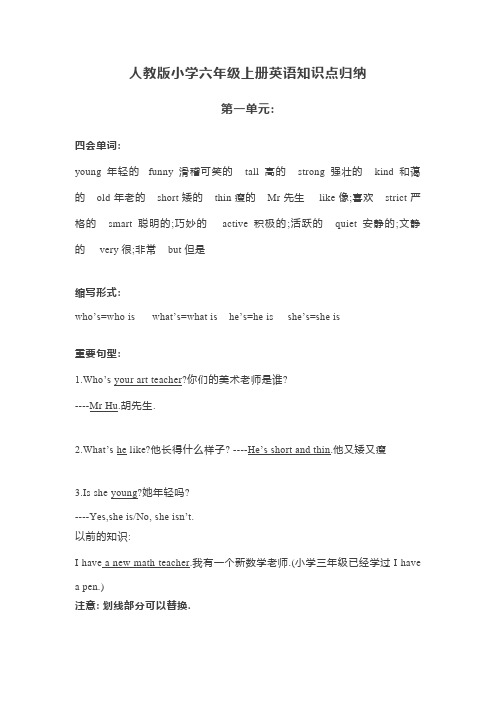
人教版小学六年级上册英语知识点归纳第一单元:四会单词:young年轻的funny滑稽可笑的tall高的strong强壮的kind和蔼的old年老的short矮的thin瘦的Mr先生like像;喜欢strict严格的smart聪明的;巧妙的active积极的;活跃的quiet安静的;文静的very很;非常but但是缩写形式:who’s=who is what’s=what is he’s=he is she’s=she is重要句型:1.Who’s your art teacher?你们的美术老师是谁?----Mr Hu.胡先生.2.What’s he like?他长得什么样子? ----He’s short and thin.他又矮又瘦3.Is she young?她年轻吗?----Yes,she is/No, she isn’t.以前的知识:I have a new math teacher.我有一个新数学老师.(小学三年级已经学过I havea pen.)注意: 划线部分可以替换.第二单元:四会单词:Monday 星期一 Tuesday星期二Wednesday星期三 Thursday星期四Friday 星期五Saturday星期六 Sunday 星期日day天;日子have有;吃on 在……时候too也;太短语:do homework 做作业watch TV 看电视read books 读书What about? ......怎么样?do housework 做家务play computer games 玩电脑游戏重点句型:1.What day is it today?今天星期几?—It’s Monday.星期一.2. What do we have on Mondays?星期一我们有什么课?—We have English,science,computer and P.E.我们有英语课,科学,计算机跟体育课.3.What do you do on Saturdays?星期六你干什么?(具体的某一天前用介词on,在具体的时间前,用介词at)—I often do my homework.我通常做家庭作业.4.What about you?你呢?—I do my homework,too.我也是做家庭作业.第三单元:四会单词:eggplant 茄子fish 鱼green beans 青豆tofu 豆腐potato 土豆tomato 西红柿for 为;给lunch 中餐;午饭we 我们tasty 好吃的;可口的sweet 甜的sour 酸的fresh 新鲜的salty 咸的favourite 最喜爱的;特别喜爱的fruit 水果grape 葡萄缩写形式:they’re=they are don’t=do not重点句型:1.What would you like for lunch?你午餐想吃什么?-----I’d like some tomatoes and mutton.我想吃一些西红柿跟羊肉.2.What’s your favourite fruit?你最喜欢的水果是什么?------/I like apples.我喜欢苹果.3.I don’t like grapes.我不喜欢葡萄.4.Bananas are my favourite.我最喜欢香蕉.第四单元一. 单词:empty the trash倒垃圾cook the meals 做饭water the flowers浇花sweep the floor扫地clean the bedroom打扫卧室make the bed铺床set the table摆餐具wash the clothes洗衣服do the dishes洗碗碟put away the clothes收拾衣服can’t = cannot(不会;不能)use a computer(使用计算机)二. 句子:1. I’m helpful!I can sweep the floor。
人教精通版六年级上册英语单词及句子

人教精通版六年级上册英语单词及句子英 [ɡet ʌp] / 起床When do you get up every day?(你每天什么时候起床?)·have breakfast英 [hæv ˈbrekfəst] / 吃早餐They are going to have breakfast.(他们要吃早饭了。
)·go to school英 [ɡəu tu: sku:l] / 去上学I go to school at 7:00.(我七点钟去上学。
)·School begins英 / 开始上课School begins at eight.(八点钟上课。
)·have lunch英 / 吃午饭It''s time to have lunch!(午饭的时间到了!)·School is over英 / 放学I''m elated that school is over.(放学了,我很兴奋。
)·go home英 [ɡəu həum] / 回家I go home at 17:00.(我17点回家。
)·have dinner英 / 吃晚饭Would you like to stay and have dinner?(你留下来一起吃饭好吗?)·watch TV英 [wɔtʃ ˈti:ˈvi:] / 看电视Do you always watch TV in the evening?(你晚上总看电视吗?)·go to bed英 [ɡəu tu: bed] / 睡觉I go to bed at 21:00.(我21:00睡觉。
)·breakfast英 [ˈbrekfəst] / n.早餐What''s for breakfast?(早餐吃什么?)·lunch英 [lʌntʃ] / n.午餐We had an exceedingly good lunch.(我们吃了一顿极为丰盛的午餐。
新版人教版小学六年级上英语单词表

六年级上册英语单词和句子Unit 1 How can I get there?science科学museum博物馆post office邮局bookstore书店cinema电影院hospital医院crossing十字路口turn left左转go straight笔直走turn right右转sir先生Italian意大利的restaurant餐馆map地图compass 指南针GPS定位系统follow跟着far远next to 与......相邻near在......附近Unit 2 Ways to go toschool.on foot步行by 经,乘bus公共汽车plane飞机taxi出租车ship大船subway地铁slow down减速train火车stop停,停车站foot脚traffic交通traffic lights交通信号灯bike自行车fast快的ferry轮渡sled雪橇must必须交通方式:on foot步行by bus乘公共汽车by bike骑自行车by plane乘飞机by taxi坐出租车by ship乘轮船by subway坐地铁by sled坐雪橇by ferry轮渡Stop and wait at a redlight.红灯停下等待。
Slow down and stop at ayellow light.黄灯减速停下。
Go at a green light.绿灯行。
Unit3 My weekendplan.我的周末计划。
visit 拜访visit my grandparents拜访我的祖父母film电影see a film 看电影trip旅行take a trip 去旅行supermarket超市go to the supermarket去超市this morning今天早上this afternoon今天下午this evening今天晚上tonight今晚next week下周dictionary词典comic滑稽的comic book儿童连环画word单词word book单词书postcard明信片lesson课Unit 4 I have a pen pal. like+动词ing形式。
- 1、下载文档前请自行甄别文档内容的完整性,平台不提供额外的编辑、内容补充、找答案等附加服务。
- 2、"仅部分预览"的文档,不可在线预览部分如存在完整性等问题,可反馈申请退款(可完整预览的文档不适用该条件!)。
- 3、如文档侵犯您的权益,请联系客服反馈,我们会尽快为您处理(人工客服工作时间:9:00-18:30)。
人教版六年级上册英语单词和句子Unit 1 How can I get there? 我怎样去那儿?
science 科学
museum 博物馆
post?office 邮局
sir
follow 跟着
far 远
next?to?与...... 相邻
near 在...... 附近
Where?is?the?cinema? 电影院在哪?It ‘s?next?to?the?bookstore. 它紧邻书店。
How?can?I?get?there? 我怎样到那儿?
Turn?left?at?the?bookstore. 在书店左转。
train 火车
stop 停,停车站
foot 脚
traffic 交通
traffic?lights 交通信号灯
bike 自行车
fast 快的
ferry 轮渡
sled 雪橇
must 必须
on?foot 步行
by?bus 乘公共汽车
Usually,?I?go?on?foot. 通常我走路去。
In the USA people on bikes must wear one. 在美国骑自行车的人必须戴(头盔)。
Don't?go?at?the?red?light! 别闯红灯!
I must pay attention?to the traffic lights! 我必须注意交通信号灯!
Unit3
My?weekend?plan. 我的周末计划。
visit 拜访
我的祖
omic 滑稽的
comic?book 儿童连环画
word 单词
word?book 单词书
postcard 明信片
lesson 课
What are you going to do tomorrow? 你明天打算做什么?
I'm going to have an English lesson. 我要上美术课。
We're?going?to?cook?in?Renmin Park. 我们要到人民公园野炊。
puzzle 谜
word?puzzles 字谜
do word puzzles 猜字谜
hiking 远足
go?hiking 去远足
study?Chinese 学中文cook Chinese food 做中国菜
pen?pal 笔友
hobby 业余爱好
What?are?your?hobbies? 你有什么爱好?
What?are?Peter's?hobbies? 彼得有
喜欢读
(you)
它(it)
和他们(they),胆子可是不简单。
只有老三胆子小,加个S保平安。
不过不要太贪婪,does加上S 减,这样一来才安全。
一般现在时的肯定句中,主语为第三人称单数的动词变化主要体现在词尾的变化上,其规律大体有
三点:
1. 一般情况下,直接在动词词尾+s ,例如:cook →cooks;
2. 以s,?x,sh,?ch,?o 结尾的动词,在词尾+?es ,例如:teach( 教)→teaches; do (做)→does; go(走)→
3.
y
scientist 科学家
pilot 飞行员
coach 教练
teacher 教师
student 学生
doctor 医生nurse 护士
policeman 警察
singer 歌手
dancer 舞者
quickly 迅速地
What?does?he?do? 他是做什么的?
哪儿工
怎么
他骑自
worry 担心
worried 担心的
happy 高兴
see?a?doctor 看病
should 应该
wear 穿
more 更多的
deep 深的
breath 呼吸
take?a?deep?breath 深深吸一口气count 数数
count?to?ten 数到十
ill
They?are?afraid?of?him. 他们怕他。
The cat is angry?. 这只猫很生气。
